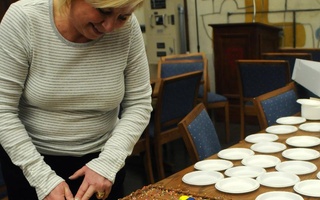Ninety years after the University began persecuting homosexual undergraduates in the infamous “Secret Court,” a group of Harvard students and affiliates have launched a movement to award those seven expelled students—two of whom committed suicide—posthumous honorary degrees at this year’s commencement.
Initiated by former University President A. Lawrence Lowell, Class of 1877, and his administration, the “Secret Court” convened for the first time in 1920 to investigate charges of homosexuality on campus. Its actions were unknown until 2002, when The Crimson published a feature on the court, which originally expelled nine students and readmitted two.
The recent movement—called “Their Day in the Yard”—was launched in June 2010 by a “student of Harvard University, who wants to help the expelled students achieve the recognition that they deserve, before she graduates,” according to its website.
This “student of Harvard University” says in an interview that she wishes to remain to anonymous because of her affiliation with the University as an Extension School student. Since the summer, however, she says she has collaborated with Jacob M. Krueger, a student at the Divinity School, and Stan Richardson, who wrote a play based on the events of the Secret Court that premiered several weeks ago in New York City.
Originally a Facebook petition, “Their Day in the Yard” has now launched its own website and begun to win support within the Harvard community. Faculty members such as Sociology Lecturer Kaia Stern have signed their names to the petition, which now has 270 supporters.
“I wholeheartedly encourage others to spread the word,” wrote Stern in a post on the movement’s website, “so that we can finally give these seven students ‘Their Day in the Yard.’”
REMEMBERING THE PAST
Unsatisfied with the formal apology issued by former University President Lawrence H. Summers on behalf of Harvard after The Crimson reported on the Secret Court in 2002, the Extension School student says that she hopes the persecuted students from the 1920s will not merely be awarded degrees but honorary degrees this coming May.
“I applaud [Summers] for making the statement, but I don’t think it’s enough,” she says. “I don’t want to forget it. I want to learn from it...I want to see Harvard grow from it.”
“An actual degree would be better than nothing, but their reputation has been damaged so badly by Harvard,” the individual adds. “The best way to correct it would be to bestow honor upon them with a special degree. If I was the president of Harvard, this is what I would do.”
But Harvard’s actual president does not necessarily agree about how best to remember the past.
In an interview, University President Drew G. Faust says that although Harvard has rarely given posthumous degrees to people other than “John Adams or someone like that,” the issue is likely to inspire discussion if it is brought up.
“What should Harvard do about things in the past? Issues like excluding women or blacks? There’s a long history—how do you think about what the past has been?” Faust says. “What I’d like to do is to direct our attention and learn from the past in order to inspire ourselves to be better in the future, because the present and the future is what matters.”
History shapes how we approach the present, but we can’t undo the past,” she adds. “What we can do is make sure that we learn from it.”
According to Jeff A. Neal, spokesman for the Faculty of Arts and Sciences, FAS does not award posthumous degrees except in the rare case of a student who completes all academic requirements for the degree but dies before the degree has been conferred.
Read more in News
IOP Panelists Discuss Presidential DebatesRecommended Articles
-
 Quincy House Honors Namesake
Quincy House Honors Namesake -
 Wheeler Wasn't the Only One
Wheeler Wasn't the Only One -
Student Groups Seek Support From Lady Gaga’s BTW FoundationWhen the collective star power of Lady Gaga, Oprah Winfrey, Deepak Chopra, and more special guests amasses inside Sanders Theatre for the launch of a new anti-bullying foundation on Wednesday, protesters will gather outside to ask Harvard to shine a spotlight on a long-gone group of people as well.
-
Students Demand Degrees for Victims of 1920 CourtAs Lady Gaga and Oprah Winfrey made their way to Sanders Theater for the launch of the Born This Way Foundation, around half a dozen students braved the snow and cold in a demonstration for Their Day in the Yard, a group advocating for posthumous degrees for gay students expelled from Harvard in the 1920s.
-
‘Acts’ Leads to Community Introspectionthe play "Unnatural Acts" by Tony Speciale gives a voice to the students silenced by Harvard’s history, but at the same time it grants the audience a concrete moment in time that allows them to see how Harvard has changed.
-
At 362nd Commencement, 7,321 Are Awarded DegreesA total of 1,651 Harvard College seniors became graduates Thursday morning as University President Drew G. Faust conferred degrees on the Class of 2013 at the University’s 362nd Commencement exercises in Tercentenary Theatre.













